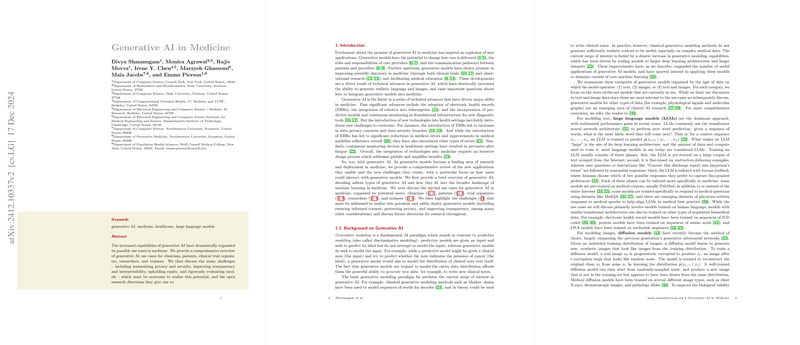Overview of "Generative AI in Medicine"
The paper "Generative AI in Medicine", authored by Divya Shanmugam et al., critically examines the burgeoning role of generative AI in the medical sector, emphasizing its applications, associated challenges, and future research trajectories. The scope of the paper is to outline the transformative potential of generative models across various stakeholders in healthcare, including clinicians, patients, clinical trial organizers, researchers, and medical trainees. The research is grounded in the rapid advancement of generative AI capabilities, notably through LLMs and diffusion models, and assesses both their use cases and the inherent challenges that need addressing to fully realize their potential.
Use Cases in Healthcare
The paper systematically categorizes the applications of generative AI in healthcare:
- For Clinicians: Generative models assist in documentation through ambient scribing technology, enhance diagnostic processes by offering differential diagnoses, facilitate information retrieval, and support evidence-based medicine by synthesizing clinical guidelines and research findings.
- For Patients: Personalized health information retrieval through AI-enhanced chatbots helps bridge gaps in understanding complex medical terms and educational content, which is especially beneficial for non-native speakers and individuals with limited health literacy.
- For Clinical Trials: AI aids in the design and management of clinical trials by automating protocol creation, optimizing participant recruitment, and minimizing dropout rates through improved patient communication.
- For Researchers: The potential for generative AI to automate data synthesis and hypothesis generation is explored, lowering the barriers for conducting comprehensive literature reviews and dataset annotation.
- For Medical Trainees: AI systems offer opportunities to generate diverse clinical vignettes and simulate patient interactions, facilitating a more comprehensive and responsive approach to medical education.
Challenges and Considerations
The integration of generative AI into medical practice is not devoid of challenges:
- Informed Consent: The complexity of AI systems poses significant ethical questions about patient consent, particularly concerning data privacy and the opacity of AI decision-making processes.
- Privacy and Security: The deployment of AI necessitates stringent measures to protect sensitive health data from breaches, given the potential for models to memorize and inadvertently reveal training data.
- Transparency and Interpretability: Generative AI models, while powerful, often function as 'black boxes'. There is a pressing need for methods that explain how decisions are made, especially as these technologies are adopted in critical healthcare settings.
- Mitigating Hallucinations: Ensuring the factual accuracy of AI-generated information is crucial, with retrieval-augmented generation (RAG) offering a potential solution by grounding generated content in reliable databases.
- Equity Considerations: The risk of introducing or exacerbating biases is inherent in AI, necessitating rigorous evaluation and remediation strategies to ensure equitable access to healthcare benefits across different populations.
Future Directions
The authors propose several directions for future research and development:
- Enhanced methodologies for ensuring model transparency and interpretability without compromising performance.
- Establishing comprehensive standards for ethical AI deployment, focusing on patient consent, data privacy, and accountability.
- Developing scalable solutions for reducing bias and improving the inclusivity of AI-generated health solutions.
- Encouraging participatory design approaches that include a diverse array of stakeholders to inform the creation and implementation of AI tools.
This paper contributes significantly to the discourse on AI in healthcare, advocating for a balanced approach that weighs technological advances against ethical and social considerations. It provides a robust framework for understanding the challenges and transformative potential of generative AI in medicine, charting a path forward for integrating these technologies into healthcare responsibly and equitably.
